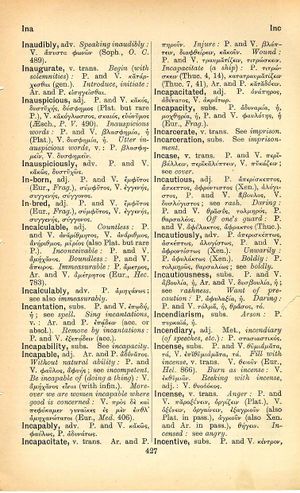incapable: Difference between revisions
From LSJ
Μετὰ τὴν δόσιν τάχιστα γηράσκει χάρις → Post munera cito consenescit gratia → Gleich nach der Gabe altert äußerst schnell der Dank
(Woodhouse 3) |
(CSV4) |
||
| Line 1: | Line 1: | ||
{{ | {{Woodhouse1 | ||
| | |Text=[[File:woodhouse_427.jpg|thumb|link={{filepath:woodhouse_427.jpg}}]]'''adj.''' | ||
Ar. and P. [[ἀδύνατος]]. | |||
<b class="b2">Without natural ability</b>: P. and V. [[φαῦλος]], [[ἀφυής]]; see [[incompetent]]. | |||
<b class="b2">Be incapable of</b> (<b class="b2">doing a thing</b>): V. [[ἀμήχανος]] εἶναι (with infin.). | |||
<b class="b2">Moreover we are women incapable where good is concerned</b>: V. πρὸς δὲ καὶ πεφύκαμεν γυναῖκες ἐς μὲν ἐσθλʼ ἀμηχανώτατοι (Eur., ''Med.'' 406). | |||
}} | }} | ||
Revision as of 09:44, 21 July 2017
English > Greek (Woodhouse)
adj.
Ar. and P. ἀδύνατος. Without natural ability: P. and V. φαῦλος, ἀφυής; see incompetent. Be incapable of (doing a thing): V. ἀμήχανος εἶναι (with infin.). Moreover we are women incapable where good is concerned: V. πρὸς δὲ καὶ πεφύκαμεν γυναῖκες ἐς μὲν ἐσθλʼ ἀμηχανώτατοι (Eur., Med. 406).

